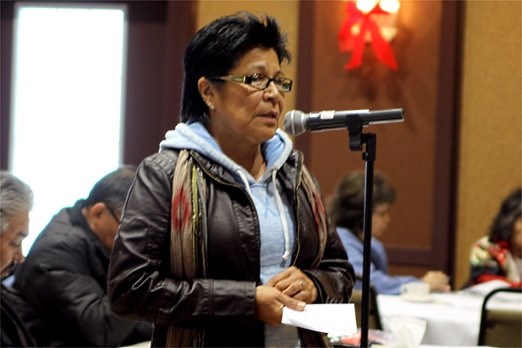Peter Kwandibens could have been a lawyer or a doctor.
Instead, after fighting off sexual abuse attempts two nights in a row at the age of 15 at the McIntosh residential school, he dropped out of school and went home.
But those two nights did enough damage and the next 20 years of Kwandibens’ life was what he calls rough.
"I got into boozing it up and drinking and all that and I guess just no sense of self-worth at all," he said. "That’s how I came out."
At the age of 35, he started his healing journey, but for Kwandibens the biggest loss was the lost opportunity to further his education.
"I could have been anything," he said. "Running away from that individual after those two nights, for me that was the biggest thing I lost – my future."
Despite what he went through, Kwandibens said he was fortunate that his experience wasn’t as vicious as some of the other stories he heard Thursday during the second day of the Truth and Reconciliation Commission’s stop in Thunder Bay at the Travelodge-Airlane Hotel.
The TRC’s mandate is to learn the truth about residential schools, how they affected generations of First Nations people, and let all Canadians know what happened. The survivor testimonies will become part of a research centre to be used by all Canadians in public education.
Kwandibens says he’s already gone on his healing journey but the commission will encourage others to do the same.
"Just hearing something like this emphasizes what I went through and solidifies the forgiveness in my own heart," he said, adding it was not easy for him to come to that place where he could forgive, but when the formal apology from the federal government came was read by Prime Minister Stephen Harper on June 11, 2008, he was ready for it.
"I believe the apology was sincere," he said. "I would like to see people really run with the apology, take it seriously… deal with it in whatever way you can and forgive because only then can you help yourself and your community. We don’t need wounded warriors; we need strong warriors in our communities."
Esther Lachinette-Diabo was in the gymnasium at Dennis Franklin Cromarty High School when the apology was read with hundreds of other people and said as she was watching it, she had already taken steps in her life to learn how to forgive.
"I left the gymnasium that day and I went for a long walk and tried to take in everything that was said in the apology," she said, adding it was important for the Canadian government to acknowledge they’ve damaged thousands of Aboriginal people.
Thursday Lachinette-Diabo stood up at the TRC and recounted her experience at St. Joseph’s Indian boarding school that was located on the corner of Arthur and Franklin Streets and how it affected her life.
Growing up on the trap line with her grandparents and extended family, the Ojibwa language and culture was an important part of her life, but at the residential schools, the children weren’t allowed to speak their native languages. If they did, they were punished physically.
"For some time after leaving the boarding school, I was embarrassed to say I could speak the native language and would always say, ‘No, I don’t understand,’" said Lachinette-Diabo.
It wasn’t until after a few dark years in her life that she began to realize there was more to life than the anger and shame she was holding onto. She attended university and became a teacher and now teaches Ojibwa as a second language at the Justice Ronald Lester Youth Centre. It’s a profession she takes great pride in.
"That’s who I am," she said. "I’m Ojibwa."
For Lachinette-Diabo, the TRC gave her the strength and courage to continue to go on and teach. She talks about her experience to her students because they suffer as family members of people who went through the residential school system as they weren’t allowed to show affection towards each other and often lost the tools to be loving parents.
"(Participating) provides further healing and it brings closure to some aspects of my life that I still deal with," she said. "I’m still not fully healed. Although there is a lot of forgiveness, I still have to heal myself as a woman."
Sign in or register
- Messages
- Post a Listing
- Your Listings
- Your Profile
- Your Subscriptions
- Your Likes
- Your Business
- Support Local News
- Payment History
Registered Users
Already have an account?
New Users
Create a free account.
